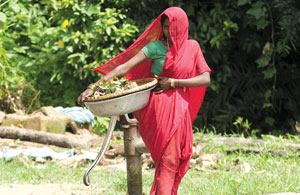 |
Tabassum Alam from Sarochiya near Biratnagar was married into a family across the border in Forbesganj six years ago. Three years later, the groom's family started to torture her to put pressure on her family to pay more money.
Tabassum's family had paid as much dowry as they could afford: Rs 300,000 in cash and a new motorcycle for the groom. When her family couldn't pay any more money, Tabassum was returned to Nepal. Her family sued the groom in the Indian courts, but after four years she hasn't got justice.
Recently, Dinesh Mandal from Bardibas arranged for his sister Sabita's wedding with a well-educated and employed young fellow-Madhesi. But the groom's family demanded Rs 500,000 and a motorbike as dowry. "We had hoped an educated man would not ask for a dowry," said the crestfallen brother.
When a mainstream daily in Kathmandu recently published details of the accumulated property of influential Madhesi ministers, they said publicly that they had acquired the property as dowry payments. They defended the practice, saying it was part of the "Madhesi tradition". Gender rights activists did not seem unduly perturbed that politicians saw nothing wrong with women being price-tagged and sold off in the name of culture in Nepal's Tarai. The rot, it seems, starts right at the top of Madhesi society.
The 2007 Madhes movement called for the restoration of the identity and dignity of Madhesis. Five years on, the leaders of the movement have been preoccupied with power consolidation at the centre. As kingmakers in the current political equation, they have put inclusive Madhes as a pre-condition to their support. But in their lexicon, identity and dignity do not include the identity and dignity of their women.
Not a single Madhesi leader has so far admitted that the Madhes's problems go beyond statelessness. While demanding political inclusion, few are willing to be inclusive in their own political and personal behaviour. The glaring absence of Madhesi, Muslim and Tharu women among decision makers in Madhesi parties ridicules the inclusion agenda they claim to champion.
The cultural decay in the Madhes is perpetuated by poverty and ignorance, reinforced by a cultural orthodoxy of the educated and powerful. The discrimination faced by Madhesi women at the hands of their own has its roots in their alienation from social, economic and political life. The victims of rape, torture and other forms of domestic violence are mostly poorer, illiterate women. Perpetrators of the violence walk free because they enjoy political patronage.
This is the same society where till not long ago, women were forced to hurl themselves into the funeral pyres of their dead husbands. Wife immolation may have been eradicated, but the patriarchal value system that spawned the practice is alive and well, manifesting itself in dowry, rape, wife-burning, acid-throwing, "witch" hunting, and honour killings. Not a day goes by without some form of domestic violence against Madhesi women by their own kind.
"The government can bring legislation to ban dowry but the state cannot police it away as long as the embedded practice is not challenged from within the community," says Mohana Ansari, one of the few Muslim lawyers in the country, and a member of the National Women's Commission.
Ansari believes the campaign to end violence against women will remain ineffective as long as those expected to lead it stand guilty of perpetuating it. She is among the few female voices from the Tarai's Madhesi and Muslim community who speaks out in Kathmandu's power circle, and blames the social conservatism of the Madhesis themselves for discouraging women from asserting themselves.
According to a recent Education Ministry report, the number of school-going women in the Tarai has gone up, but the dropout rate is high and their participation in higher education remains low. Crimes against women in the Madhes stems from their disempowered status. Effective legislations, community mobilisation and gender sensitisation can help safeguard their rights, but long term solutions lie in ensuring access to mainstream social, political and economic life.
But that seems to be in no one's agenda, least of all for leaders steeped in patriarchy who are supposed to represent the Madhes.
(Names of the victims have been changed)
Read also:
Rape for ransom, SHATRUDHAN KUMAR SHAH in MAHOTTARI
Police don't arrest rapists in the eastern Tarai, they give in to local pressure and marry them off to their victims



